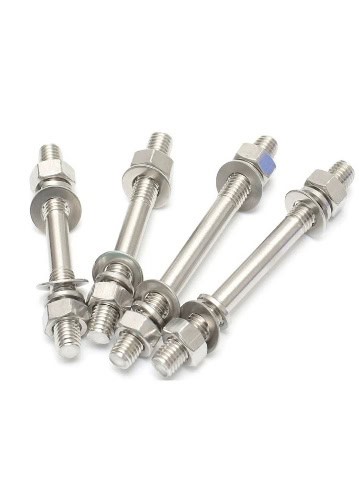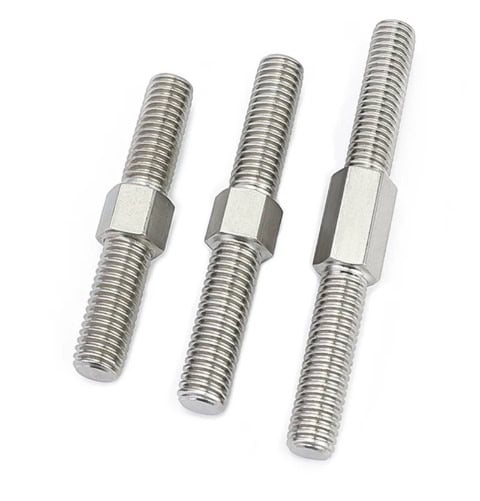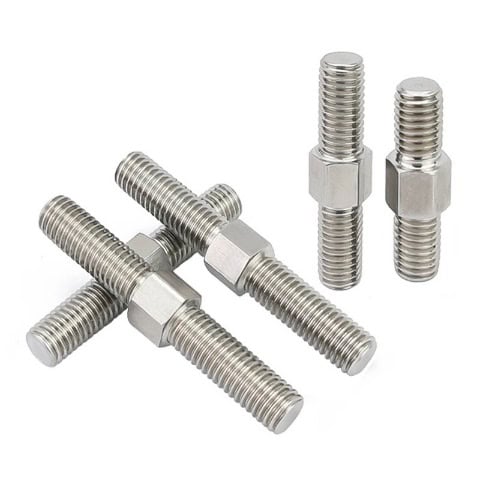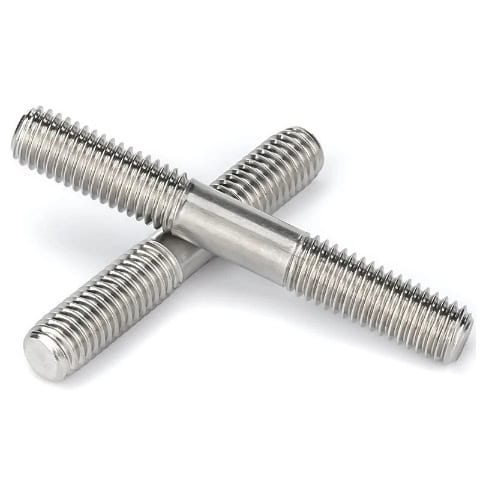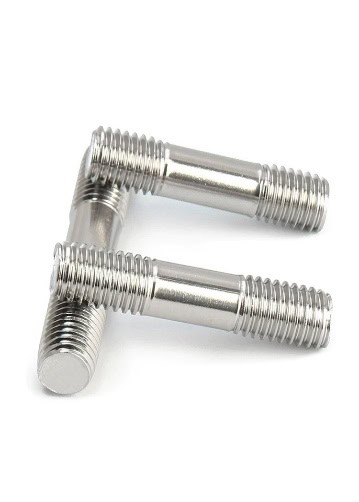stud bolts
Stud bolts are fully threaded rods with two heavy hex nuts, designed for flanged connections in high-pressure and high-temperature applications. Commonly used in petrochemical, energy, and industrial machinery sectors, stud bolts provide strong, reliable, and easily maintainable fastening solutions.
Home - stud bolts
Functions and Benefits
Our stud bolts are manufactured according to international standards (ASTM, ASME, DIN, ISO) with strict quality control throughout the production process.
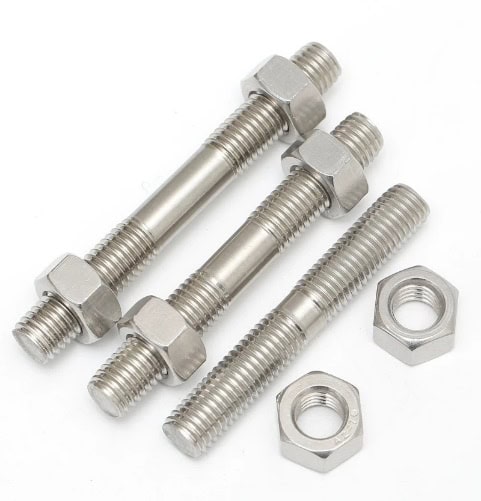
Typical Product Variants
| Product Type | Material | Size Range | Thread Type | Surface Finish | Standard |
|---|---|---|---|---|---|
| Stud Bolt A193 B7 | Alloy Steel | M6–M100 / 1/4″–4″ | UNC / UNF / Metric | Black, Zinc, HDG | ASTM A193 B7 / A194 2H |
| Stud Bolt SS316 | Stainless Steel | M8–M80 | Metric / UNC | Plain / PTFE Coated | ASTM A193 B8M |
| Custom Stud Bolts | Per drawing | Per request | Any | Customized | DIN / ISO / OEM |
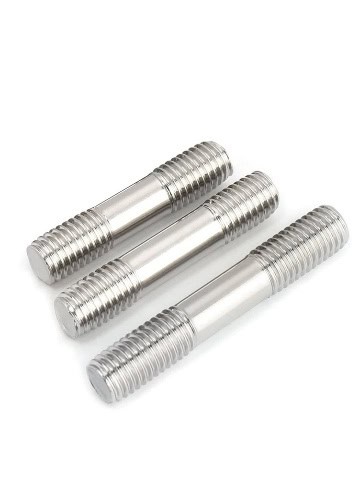
Manufacturing Process
We follow a rigorous, standardized manufacturing process to ensure strength, durability, and precise threading:Material Selection
Carbon steel, alloy steel, stainless steel (SS304, SS316, etc.)
Heat number traceability and mill certificates provided
Cutting & Thread Rolling Precision cutting to length
Cold or hot thread rolling depending on material and size
Heat Treatment Quenching and tempering for mechanical strength
Process controlled per ASTM specifications Surface Treatment Options Black oxide, zinc plating, hot-dip galvanizing
PTFE, Xylan, or other anti-corrosion coatings available
Inspection & Quality Control Dimensional checks with thread gauges Hardness and tensile testing
100% visual inspection before packaging
Typical products
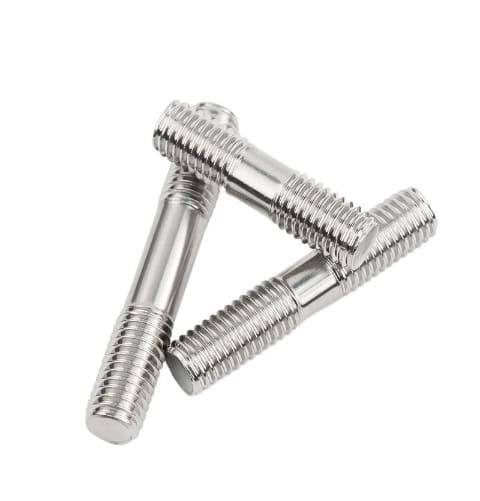
304 stainless steel stud bolts M3M4M5M6M8M10M12M14M16M20
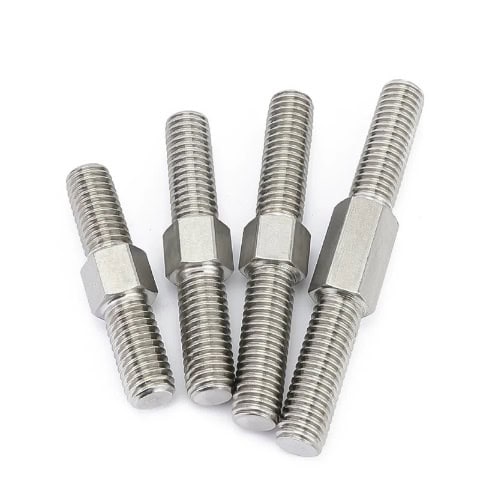
304 stainless steel hexagon stud bolts M4M5M6M8M10M12M16
Applications and Use Cases

Industry: Oil & Gas Location: Kuwait Client: Major petrochemical contractor (confidential) Application: Crude oil distillation unit – flange connections on heat exchanger systemsChallenge: The facility required stud bolts for flanged joints exposed to temperatures exceeding 450°C and high sulfur environments. Existing bolts from a different supplier were experiencing accelerated corrosion and loss of preload during thermal cycling.Solution: We supplied ASTM A193 B16 stud bolts with ASTM A194 Grade 7 heavy hex nuts, both PTFE-coated for enhanced corrosion resistance. The bolts were manufactured with full traceability, and each batch passed tensile strength and hardness testing as per NACE standards.Result:Zero bolt failure after 18 months in serviceReduced downtime during maintenance cyclesImproved joint reliability under thermal expansionPositive feedback led to repeat orders for two additional refinery units

Industry: Power Generation Location: Germany Client: EPC contractor for a coal-fired power station Application: Mounting and securing turbine base supportsChallenge: The turbine foundation required high-strength fasteners that could maintain tension under vibration, high mechanical loads, and thermal stress over long operational periods. The bolts also needed to comply with EN 1090 structural steel regulations.Solution: We provided custom-length M56 stud bolts made from 42CrMo alloy steel, heat-treated to 10.9 class strength. All bolts were ultrasonically tested, and the threads were rolled, not cut, to improve fatigue resistance. Surface treatment: Hot-dip galvanized to prevent rust in semi-outdoor environments.Result:Vibration stability significantly improved during commissioningEasy access for retightening and torque control due to stud bolt + nut setupPassed third-party inspection by TÜV SÜDBolts remain in use with no signs of loosening or fatigue after 2+ years
Top Uses and Benefits of Stud Bolts in Industrial Applications
Introduction to Fasteners
Stud bolts and threaded rods are common fasteners used in various industrial applications to provide strong connections.
Fasteners like stud bolts and nuts are essential components in construction and machinery.
The choice of fastener depends on the application, with stud bolts being commonly used in high-pressure and high-temperature settings.
Industrial settings require durable and reliable fasteners, such as stud bolts, to ensure safe and efficient operations.
Stud bolts are designed to meet specific requirements, including thread size, material, and length.
Comparison with Other Fasteners
Threaded rods are another type of fastener that differs from stud bolts in terms of thread length and application.
Double end studs are a type of stud bolt that offers versatility in industrial applications.
Stud bolts are preferred over other fasteners in certain applications due to their high tensile strength and resistance to corrosion.
The entire length of a threaded rod can be threaded, whereas stud bolts have threads on both ends. Additionally, the body of a stud bolt (its central shaft) can be full or reduced, and this design affects its fit and strength in specific applications.
Stud bolts are commonly used in industrial settings where strong connections are required.
Standards and Specifications
ASTM A193 is a standard that specifies the requirements for stud bolts used in industrial applications.
Stud bolts are produced in various sizes, lengths, and materials to meet different standards and specifications.
The thread size and pitch of a stud bolt are critical factors in ensuring a strong connection.
Double end studs are available in various configurations to meet specific application requirements.
Stud bolts are designed to provide strong connections in various applications, including construction and machinery.
Design and Configuration
Stud bolts are available in different types, including double end studs and single end studs.
The design and configuration of a stud bolt depend on the application and required specifications.
Stud bolts can be produced with various thread sizes and pitches to meet specific requirements.
The material used to manufacture stud bolts can vary, including steel and stainless steel.
The length of a stud bolt can be customized to meet specific application requirements.
High-Temperature Applications
Stud bolts are commonly used in high-temperature applications, such as power plants and chemical processing.
High-temperature resistance is a critical factor in selecting stud bolts for industrial applications.
Stud bolts are designed to withstand high temperatures and maintain their tensile strength.
The material used to manufacture stud bolts can affect their high-temperature resistance.
Stud bolts are preferred over other fasteners in high-temperature applications due to their reliability and durability.
Industrial Applications of Stud Bolts
Stud bolts are widely used in various industrial applications, including construction, machinery, and power generation.
Industrial settings require stud bolts that can provide strong connections and withstand harsh environments.
Stud bolts are used in applications where high tensile strength and resistance to corrosion are required.
The versatility of stud bolts makes them a popular choice in various industrial applications.
Stud bolts are designed to meet specific requirements, including thread size, material, and length.
Benefits of Using Stud Bolts
Stud bolts provide strong connections and are reliable in industrial applications.
The use of stud bolts can reduce maintenance costs and downtime in industrial settings.
Stud bolts are easy to install and remove, making them a convenient choice for industrial applications.
The high tensile strength of stud bolts makes them suitable for applications where heavy loads are involved.
Stud bolts are resistant to corrosion and can withstand harsh environments.
Latest Developments in Stud Bolts
New products and technologies are being developed to improve the performance and reliability of stud bolts.
Advances in materials and manufacturing processes have led to the development of high-strength stud bolts.
The use of advanced materials and coatings can improve the corrosion resistance of stud bolts.
Stud bolts are being designed to meet specific application requirements, including custom thread sizes and pitches.
The development of new stud bolt products is driven by the need for reliable and durable fasteners in industrial applications.
We work closely with customers to provide tailored fastening solutions and address specific project needs, ensuring our products meet the unique requirements of every application.
Key Factors to Consider When Choosing Stud Bolts
When selecting stud bolts for industrial applications, several key factors must be taken into account to ensure optimal performance and durability. These factors include:
Material and Finish
The choice of material significantly impacts the stud bolt’s strength, corrosion resistance, and suitability for high-temperature environments. Common materials include carbon steel, stainless steel, and alloy steel. Finished stud bolts with protective coatings or treatments provide enhanced resistance to wear and environmental factors.
Thread Size and Diameter
Thread size and diameter are critical in determining the compatibility of stud bolts with nuts and other components. The diameter affects the tensile strength and load-bearing capacity, while the thread size ensures proper fit and fastening.
Length and Configuration
Stud bolts come in various lengths and configurations, such as double end studs and single end studs. The length should be selected based on the application requirements, ensuring enough thread engagement for secure connections. The configuration depends on whether the stud bolt will be inserted into tapped holes or used with nuts on both ends.
Standards and Specifications
Compliance with industry standards like ASTM A193 guarantees that stud bolts meet specific mechanical properties and quality requirements. These standards define aspects such as material composition, tensile strength, and thread dimensions, ensuring reliability in demanding industrial settings.
Application Requirements
The intended use of stud bolts—whether in high-temperature environments, heavy load-bearing structures, or corrosion-prone areas—affects the selection process. Understanding the application helps in choosing stud bolts with appropriate material, finish, and design features.
Ease of Installation and Maintenance
Stud bolts designed for easy installation and removal can reduce downtime and maintenance costs. Features like finished ends and standardized thread sizes contribute to efficient assembly and disassembly.
Availability and Customization
Depending on project needs, the availability of standard sizes and the option to order custom stud bolts with specific lengths, thread pitches, or materials can be crucial. Reliable suppliers offer a range of products and customization services to meet diverse requirements.
By carefully considering these key factors—material, thread size, length, standards, application, installation ease, and availability—you can find stud bolts that provide strong, durable connections tailored to your industrial needs.
DingLong Solutions for Stud Bolts
DingLong is a reputable manufacturer and supplier of high-quality stud bolts and fasteners designed to meet the demanding requirements of various industrial applications. Their solutions include a wide range of stud bolts produced according to industry standards such as ASTM A193, ensuring durability, tensile strength, and resistance to high temperatures and corrosion. DingLong offers customized options in terms of thread size, length, material, and finish, providing customers with the desired fastener solutions to suit specific project needs. With advanced manufacturing processes and stringent quality control, DingLong stud bolts deliver reliable performance and ease of installation, making them a preferred choice in construction, machinery, and power generation industries.
Conclusion and Recommendation
In conclusion, selecting the right fastener—whether it’s a stud bolt, threaded rod, or double end stud—requires a clear understanding of your project’s specific requirements. Each type of fastener offers unique advantages: stud bolts are renowned for providing strong connections and exceptional tensile strength, making them the preferred choice in industrial settings where high temperature and heavy loads are common. Threaded rods, with their versatility in thread size and length, are ideal for various applications that demand precise adjustment and flexibility. Double end studs are commonly used in construction and machinery, offering reliable performance where strong, secure connections are essential.
When choosing a stud bolt or threaded rod, it’s important to consider factors such as thread size, material, and length, as these directly impact the fastener’s performance and durability. Adhering to recognized standards like ASTM A193 ensures that your fasteners meet stringent requirements for chemical composition, heat treatment, and mechanical properties, providing peace of mind in demanding industrial applications.
The availability of new products and the ease of online ordering make it simpler than ever to find fasteners that meet your exact needs. Leading manufacturers and suppliers offer a wide range of options, including custom thread sizes, finishes, and lengths, so you can order the desired product for your specific application. Whether you require inch or metric threads, specialized finishes, or unique lengths, there are fasteners designed to meet your requirements.
Ultimately, the key to success lies in carefully evaluating your application’s needs and selecting a fastener that offers the right combination of strength, durability, and ease of installation. Take the time to compare different types and sizes, consult with reputable manufacturers, and ensure that your chosen product meets all necessary standards. By doing so, you’ll ensure that your industrial, construction, or machinery project benefits from strong, reliable connections that stand the test of time.
Contact DingLong
Frequently Asked Questions (FAQ)
Do you offer third-party inspection or certificates (e.g., SGS, BV)?
A: Yes, we can arrange third-party inspection and provide material test certificates upon request.
Q: Can I order custom sizes or materials?
A: Absolutely. We support OEM orders and custom dimensions, coatings, and packaging.
Q: What is your typical lead time?
A: Standard sizes ship within 3–5 working days. Custom orders usually take 7–15 days depending on complexity.
Q: Are your products export-ready?
A: Yes. We support FOB, CIF, and DDP shipping terms and can supply to over 60 countries.
Q: What standards do your stud bolts meet?
A: We manufacture according to ASTM, ASME, DIN, and ISO standards. Certification documents are available.

